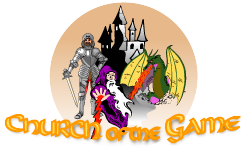Mitch Evans has posted Game Dream #1
After reading the last 2 Game Wish posts I was very pleased to see the start of the game dreams. I have net been keeping up with this blog very well so hopefully this will be the kick in the ass I need to keep it going.
When Role Playing Games are discussed, the subject of first-person versus third-person character narratives sometimes surfaces. When you play a character, do you assume first-person, using your voice as his or hers, or do you use third person, simply describing what he or she is doing? Do you switch between first and third person, or try to adhere to one? When other players are in character, does the use of first or third person affect your immersion in the game?
I actually try to use first and third person for different effects.
First person is for 'real time' interaction. If the players are talking to the watch guard and the conversation is going to go on verbatim. I will assume first person. On the other hand, if the conversation is just a back drop for something else, I will use third person to summarise the key things that happened in the conversation. For example if the players are talking with the bartender looking for info about the location of someone. I will summarise the key information they gleaned in third person. I had a player describe this as first person for the game, third person for the 'cut scenes'.
All combat is described in third person though. That's mainly because I describe what the players can see is happening not what the opponent is planning. It is not until the opponent act that they get to hear what actually happened.
Finally, to be completely honest this behavior is just a goal. I stick to it for the first hour or two of a session the slowly slip into more and more third person.
As A player I try to use first person to say what the character is saying, and third person for out of proposed action descriptions. For example, if I am going to try to rob a storekeeper, I might say "I was wondering if you can show me some pearl earrings.",then add, "He is going to try to force the clerk to the floor and tie him up once the display case is unlocked."
I don't find that the mixing of voices interferes with the enjoyment of the game. I think it might change the immersion of the game, where third person leads to more of a spectator of events rather than participant in the events.
I do find that the group speaks together. If one member starts off in third person, then those that follow will continue in third person.






